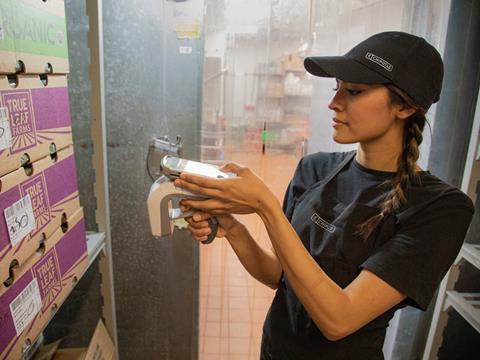
Major international restaurant chain Chipotle Mexican Grill is testing radio-frequency identification (RFID) technology to enhance its traceability and inventory systems at its Chicago distribution centre and approximately 200 restaurants in the greater Chicago area.
Chipotle is one of the first major restaurant companies to leverage RFID case labels to track ingredients from suppliers to restaurants via serialization and so improve food safety along its supply chain.
“RFID labels transform inventory management into an automatic, digital function that optimizes restaurant operations and gives our Restaurant Support Centres access to inventory data in real-time,” said Scott Boatwright, Chief Restaurant Officer for the company. “This integrated technology is improving our employee experience in participating restaurants while also benefiting our supply partners.”
Chipotle teamed up with leading RFID partners including RFID software provider Mojix, materials science and one of the largest RFID inlay developers, Avery Dennison and RFID reader and encoder solutions provider Zebra Technologies, both of whom are members of AIPIA.
The company is committed to ‘Food with Integrity’ standards and purchased more than 35 million pounds of locally grown produce in 2021. It has spent more than $400 million in food premiums over the last two years to buy responsibly sourced and humanely raised ingredients. The brand is now giving further transparency into the direct source of its ingredients and has worked closely with the Auburn University RFID Lab to refine the pilot program, which is being tested on meat, dairy, and avocados from five Chipotle suppliers.
Ingredients in the test arrive at Chipotle restaurants with RFID-enabled case labels and are scanned by RFID readers, which complement existing scanners in the restaurants, requiring minimal incremental investment, it says. The tech-enabled traceability system is designed to allow the company to act on food safety and quality concerns swiftly, efficiently, and precisely.
Participating suppliers have invested in RFID technology using Chipotle specifications, which is anticipated to save suppliers time on inventory management and stock rotation, mitigate human error, and increase expiration date visibility and accountability. The restaurant chain invited key supply partners to participate in the test and provided partners with an RFID playbook with best practices and benefits of the program. The brand is leveraging its stage-gate process to test, listen and learn from employees and suppliers before deciding on a system-wide rollout of RFID labels.
“We have been developing our RFID program for two years and see this innovation as the next evolution of traceability and food safety,” said Laurie Schalow, Chief Corporate Affairs and Food Safety Officer. “We are excited to test this innovation in the field with our suppliers and restaurants to enhance our robust traceability program.”
Chipotle had over 2,950 restaurants at December 31, 2021, in the United States, Canada, the United Kingdom, France and Germany and is the only restaurant company of its size that owns and operates all its restaurants, it claims.
This article was created in collaboration with AIPIA (the Active and Intelligent Packaging Industry Association). Packaging Europe and AIPIA are joining forces to bring news and commentary about the active and intelligent packaging landscape to a larger audience. To learn more about this partnership, click here.













No comments yet